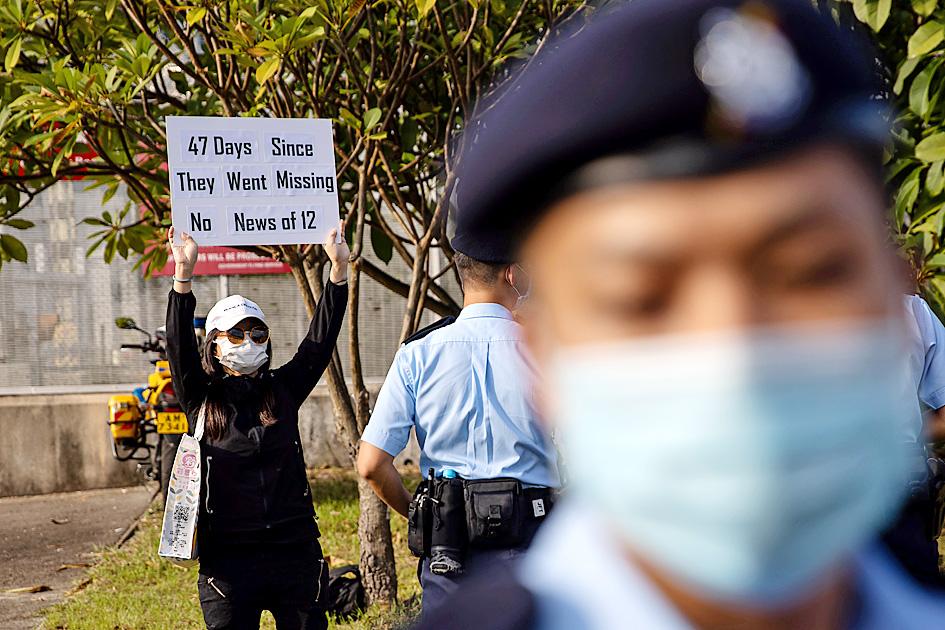Hong Kong police yesterday said that they had arrested nine people suspected of helping 12 Hong Kong pro-democracy advocates who fled the territory in August, heading for Taiwan, only to be intercepted by Chinese authorities and held in China.
The plight of those who fled has grabbed international attention and sparked concern among human rights groups, as their families say that they are being denied access to independent lawyers and air suspicions that Hong Kong authorities helped China to make the arrests.
Accused of crimes tied to pro-democracy protests in Hong Kong last year, the fugitives are being detained in Shenzhen, China, after authorities intercepted their boat and accused them of illegal border crossing.

Photo: EPA-EFE
Yesterday, police arrested four men and five women suspected of arranging transport for the fugitives, the Hong Kong Police Force’s Organized Crime and Triad Bureau Superintendent Tony Ho Chun-tung (何振東) said.
“One direction of the investigation is whether they helped others to flee,” Ho said, adding that he did not rule out the possibility of more arrests.
He dismissed the relatives’ accusations that local police played a role in the arrests in China.
“The arrests on the mainland had nothing to do with the Hong Kong police,” Ho added.
Police also seized HK$500,000 (US$64,516) in cash, computers, mobile phones and documents related to the purchase of a boat.
People began fleeing Hong Kong for Taiwan from the early months of the protests, most of them legally, by air, but some by fishing boat, people in Taipei who helped Hong Kong residents obtain visas have said.
Hong Kong authorities have said that those detained are to be represented by mainland lawyers of their choice, albeit from a list provided by Chinese authorities.
Their families have been offered “needed and feasible” assistance, which is to continue, the authorities have said.

The Ministry of the Interior (MOI) is to tighten rules for candidates running for public office, requiring them to declare that they do not hold a Chinese household registration or passport, and that they possess no other foreign citizenship. The requirement was set out in a draft amendment to the Enforcement Rules of the Public Officials Election and Recall Act (公職人員選舉罷免法 ) released by the ministry on Thursday. Under the proposal, candidates would need to make the declaration when submitting their registration forms, which would be published in the official election bulletin. The move follows the removal of several elected officials who were

The Republic of China (ROC) is celebrating its 114th Double Ten National Day today, featuring military parades and a variety of performances and speeches in front of the Presidential Office in Taipei. The Taiwan Taiko Association opened the celebrations with a 100-drummer performance, including young percussionists. As per tradition, an air force Mirage 2000 fighter jet flew over the Presidential Office as a part of the performance. The Honor Guards of the ROC and its marching band also heralded in a military parade. Students from Taichung's Shin Min High School then followed with a colorful performance using floral imagery to represent Taiwan's alternate name

FOUR DESIGNATED AREAS: Notices were issued for live-fire exercises in waters south and northwest of Penghu, northeast of Keelung and west of Kaohsiung, they said The military is planning three major annual exercises across the army, navy and air force this month, with the navy’s “Hai Chiang” (海強, “Sea Strong”) drills running from today through Thursday, the Ministry of National Defense said yesterday. The Hai Chiang exercise, which is to take place in waters surrounding Taiwan, would feature P-3C Orion maritime patrol aircraft and S-70C anti-submarine helicopters, the ministry said, adding that the drills aim to bolster the nation’s offshore defensive capabilities. China has intensified military and psychological pressure against Taiwan, repeatedly sending warplanes and vessels into areas near the nation’s air defense identification zone and across

A Chinese takeover of Taiwan would severely threaten the national security of the US, Japan, the Philippines and other nations, while global economic losses could reach US$10 trillion, National Security Council Deputy Secretary-General Lin Fei-fan (林飛帆) wrote in an article published yesterday in Foreign Affairs. “The future of Taiwan is not merely a regional concern; it is a test of whether the international order can withstand the pressure of authoritarian expansionism,” Lin wrote in the article titled “Taiwan’s Plan for Peace Through Strength — How Investments in Resilience Can Deter Beijing.” Chinese President Xi Jinping’s (習近平) intent to take Taiwan by force